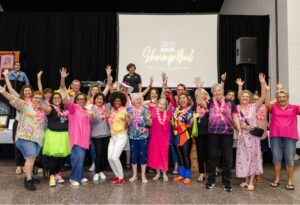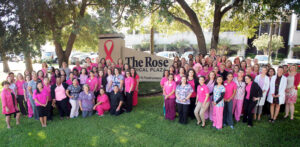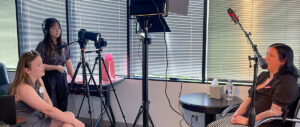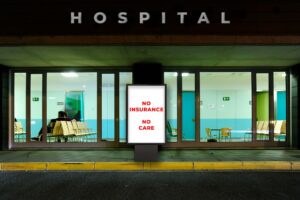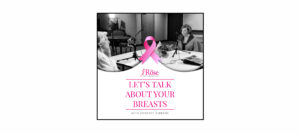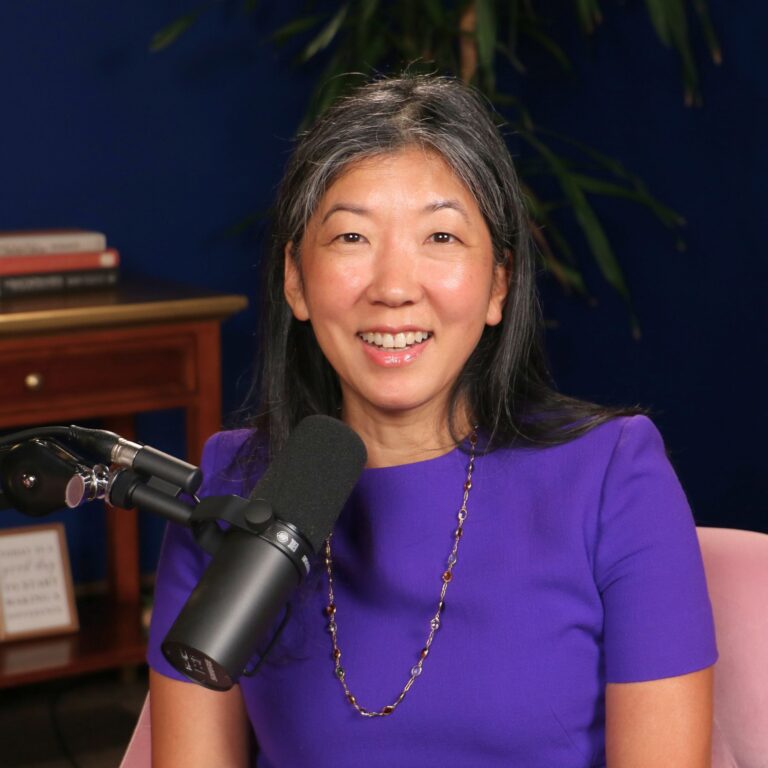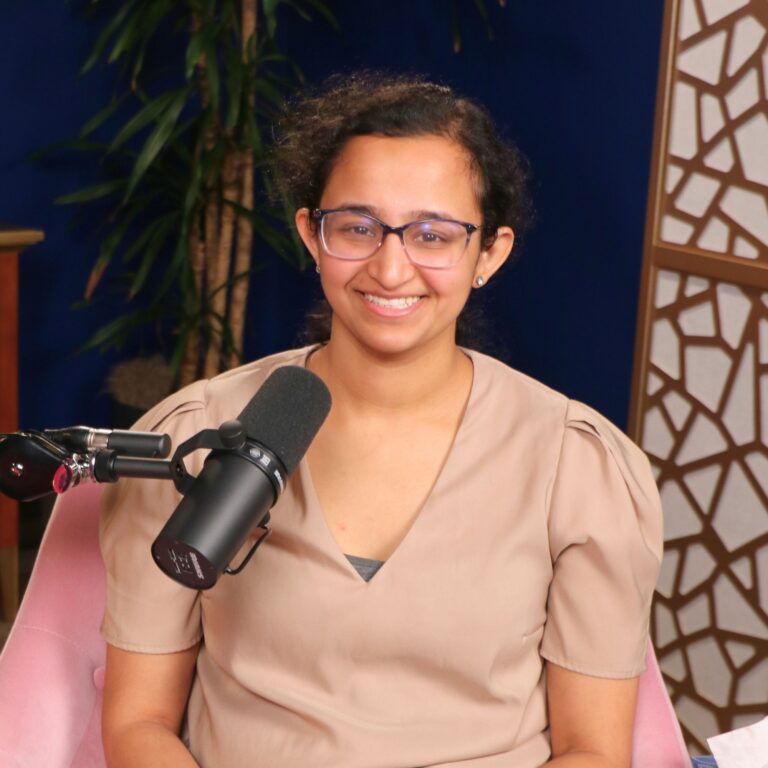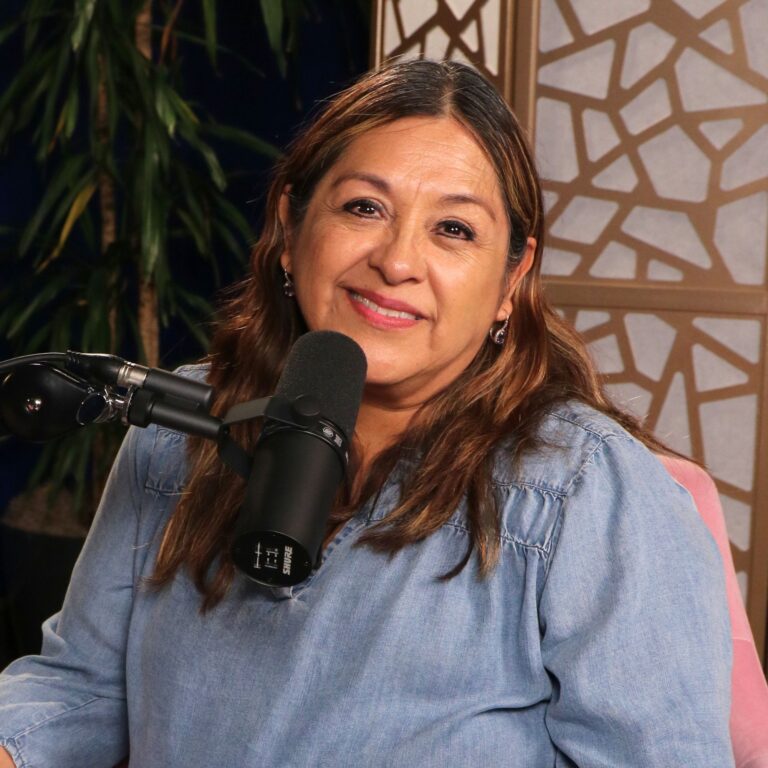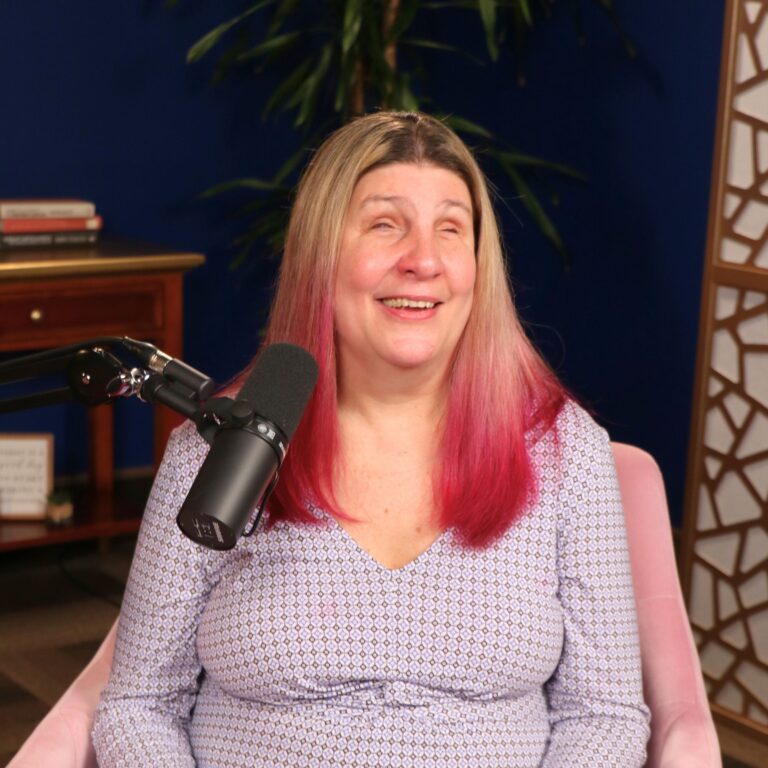Dorothy: [00:00:00] Stacy Papillion, better known as Sergeant Pap, is a law enforcement officer with the Galveston PD. She has been through breast cancer not once, but twice, and had her mother going through it at the same time. Stacy’s story is one of courage, one of resiliency, one of having your, your brothers and sisters in blue stand right beside you.
But it’s also one of recognizing the differences that happen if your skin happens to be black. You’ll hear more about this in this episode of Let’s Talk About Your Breast. When you subscribe to our show, you help us grow. Someone you know may need to hear this story. So please, share with your family and friends, and consider supporting our mission.
Your donation can help save the life of an uninsured woman.[00:01:00]
Let’s Talk About Your Breast. A different kind of podcast presented to you by The Rose. The Breast Center of Excellence and a Texas treasure. You’re going to hear frank discussions about tough topics and you’re going to learn why knowing about your breast could save your life.
Stacy, thank you so much for being with us here today.
Stacy: It’s an honor. Thank you.
Dorothy: You know, I have never had a police officer on this show before. So tell me what in the world attracted you to becoming a police officer?
Stacy: Well, honestly, um, I needed some money. I had, uh, at the time, uh, three, three daughters. And I was in the medical field. I was a CNA.
Dorothy: Oh.
Stacy: And didn’t pay much. And so I was thinking, like, goodness, what can I do? I need some more— I need to get in a different tax bracket. You know, so I was thinking. So, um, I thought about nursing. Come at REN. [00:02:00] But then, being a police officer, it didn’t take four years, you know, at the time. And, um, DPS actually, at the time, I saw in the newspaper, uh, they were having a, a, a hiring, uh, process for, they were trying to hire more females. So, I was like, goodness, police academy, nine months? R. E. N. four years. Here we go, you know, police academy. So, I didn’t grow up saying I wanted to be a police officer or anything like that. I just, honestly, that’s the honest answer. Uh, I needed more money to, uh, take care of my daughters.
Dorothy: Well, what an amazing career you’ve had, though, since then. I mean, you know, and I, I think about what you just said about they needed more females.
Stacy: Mm hmm.
Dorothy: And here you are, female police officer who has discovered she has breast cancer. Now, how, how important was the support of all of your colleagues during that?
Stacy: There are no words for it. Um, it’s kind of hard to put it in words. Um, the support that I received from all of my brothers and sisters in blue was [00:03:00] astounding. Um, it was very important in my journey the first and second time. Um, that I was, that I was diagnosed, it was a godsend. You never know how much you need people until you need people.
Dorothy: Oh, right.
Stacy: And I’ve always been of the opinion that, uh, people care because they want to, not because they have to. All of my brothers and sisters at the Galveston Police Department, not only the Galveston Police Department, just in the law enforcement community, they rallied around me, you know, They put me in their prayers and they just, you know, when I was weak, they were strong for me.
Dorothy: Oh. Oh, that is so sweet. I never think about men, you know, being that support, uh, system for, for our women, but they are, of course, and, and now go back to, you’re a two time breast cancer survivor.
Stacy: Yes, ma’am.
Dorothy: How, uh, How did you find your breast cancer that first time?
Stacy: Well, the first time, I was just, you know, kind of, [00:04:00] I was laying down in the bed and I laid on my, on my stomach.
And so I felt like a little, like a little pain, you know, on my left side. And, which wasn’t uncommon because, you know, women, we have menstrual cycles, you know, we get a little tender there. But, you know, I rolled over and I just kind of started feeling, you know. So I felt like this little bitty. like a pebble, you know, on my left side.
So, uh, you know, the type of person I am, I’m going to call the doctor with, with whatever I can have a hangnail and I’m making an appointment because it hurt. Uh, so I called my, uh, my gynecologist office at the time, that same day. And so they had an appointment two days later. So I went in and, uh, my gynecologist, uh, He told me, he said, well, he felt it, and he said, well, I’m not really concerned about it being, uh, cancer. He said, because it normally doesn’t present with pain. He said, but, and I was 35, so he said, but you know, you’re getting close to the age to where we’re gonna start the mammograms and all that, so I’m [00:05:00] gonna go ahead, you know, just be on the safe side and send a referral. And, um, I went in to Victory Breast Imaging, um, got my first mammogram and ultrasound, and that’s when it was discovered. Um, I kinda had an idea something was wrong because, you know, uh, and that was my first mammogram and ultrasound. But, you know, when something’s wrong, they kind of start taking a lot of pictures and, and they, you know, kind of start, more people starts coming in and, and looking at the, looking at the screen as well.
And, you know, I’m sitting there looking like I know what I’m looking for because I don’t, but I’m trying to figure out what are y’all doing? Like, what are y’all looking for? So, but thank God it was caught very early. Uh, it was stage two, and um, I was able to get through that diagnosis with only, uh, God’s blessings. And it’s healing.
Dorothy: Now, Stacy.
Stacy: Yes, ma’am.
Dorothy: You just told us three different things there, and it’s some things that women don’t always do.
Stacy: Yeah.
Dorothy: First of all. Usually cancer doesn’t hurt. But you were paying attention to your [00:06:00] body.
Stacy: Yes, ma’am.
Dorothy: And, you know, I’m always amazed at the number of women who have said, there was just this little twinge, or there was just something that was telling me I need to go get that checked.
Stacy: Yeah.
Dorothy: So that’s first message, let’s always listen to our bodies. Second one was you actually did something. I mean, a lot of women, that’s a huge message. We’ll say, okay, I’ll take care of that later, or I have too much to do to go to the doctor. But you know, what made you so health conscious?
Stacy: Well, like you, like you mentioned about listening to our bodies, I’ve always did that. My mom always taught me, um, to do that. Um, she said, your body’s going to tell you something’s wrong before your brain tells you something’s wrong. Uh, so, um—
Dorothy: Great advice.
Stacy: Yes, ma’am. Yeah. Um, so I, I. Even though I didn’t have a history of breast cancer, I didn’t even know anyone who had breast cancer. I just knew I’d never felt that in my body, uh, before. And, you know, we pay a lot of money for health insurance.
Dorothy: Oh, yes.
Stacy: You know, we pay a lot of money for health insurance. [00:07:00] So you may as well use it.
Dorothy: Yes.
Stacy: You know, you may as well use it. So, of course, from, you know, what my mom has always instilled in me to listen to my body and pay attention to things. I called a doctor right away. You know, I called a doctor right away. I didn’t want to put it off. I didn’t think it was, you know, anything, but I just had never felt it before.
Dorothy: And you know, that’s the other thing, your doctor actually listened to you.
Stacy: Yes, ma’am.
Dorothy: I mean, that, you’re a young woman, you know, you have no family history, there’s no reason for you to even have breast cancer, and yet that doctor paid attention and, and went ahead and ordered for you.
Stacy: Yes, ma’am.
Dorothy: That, that is another important message.
Stacy: Yes, ma’am.
Dorothy: If your doctor didn’t listen to you, you need to find another doctor.
Stacy: Exactly. Exactly.
Dorothy: So, did your, describe what you do on a daily basis. I mean, you know, I, I, I have these visions of, of you hunting down criminals and, you know, all kind of things. So, what, what does your job entail?
Stacy: Well, currently, I supervise [00:08:00] detectives and criminal investigations. Um, I supervise property crimes, and right now, I’m starting to supervise family services. Um, I’m also the commander of the Galveston Police Department Honor Guard, and I’m also a part of the Crisis Negotiations Team, uh, and I’m also, uh, a part of the Public Information Officers Team.
Dorothy: Goodness. So, in any of those, you, you are very active.
Stacy: Yes, ma’am.
Dorothy: And, and you’re in physical contact at times.
Stacy: Yes, ma’am.
Dorothy: With, uh, Different people.
Stacy: Yes, ma’am.
Dorothy: And I’m wondering, how did your day to day work schedule change when you were having treatment? Did you— describe your treatment first. Did it, did you have surgery and?
Stacy: Okay, um, so, and I’ll, I’ll go back and I’ll do, I’ll talk about my 2013 diagnosis, my first one, and then, because they were different. They were different. Um, so, um, in 2013, uh, when I was diagnosed, I had chemotherapy, I had radiation, and I [00:09:00] had a surgery, uh, called a lumpectomy.
Dorothy: Okay.
Stacy: Okay. So when I was, I was working, you know, at that time as well, and, and this is just strictly God’s blessings, you know, during this journey. I worked patrol, uh, for as long as I, you know, as long as I wanted to. And of course my supervisors were like, no, you need to come off those streets, you know, we can put you inside. But I was actually feeling fine, you know, I was actually feeling fine going through chemo. So I actually broke my finger, you know, in a, in a class ground fighting.
While I’m going through chemotherapy, you know, cause I, I felt fine. However, uh, so, and, and, and I ended up losing my hair in that diagnosis. And, and I mentioned it to you before. Like, in that diagnosis when I have to think back, uh, beyond just hearing your name in the sentence of breast cancer, you know. But other than that, it was losing my hair.
Dorothy: Oh yeah.
Stacy: You know, it was losing my hair. And, and. I went to MD Anderson and my, uh, my team was just amazing. And so my oncologist, uh, she was, she told me, she says, Sweetie, you’re going to lose [00:10:00] your hair. And I was like, are you sure? Everybody, a hundred percent of the people, you know, because I wanted to be that one percent that it didn’t happen to.
And, and so she was like, no, sweetheart, I’m sorry. You are, but it’s hair. It comes back, you know, it grows back. Um, and so, uh, So while I, while I was working, I mean, like I said, I had so much support. I was still on patrol, I was still answering calls, you know, I was just still doing my thing up until I broke my finger.
And I feel like that was God’s way of saying, sit down. Sit down and, um, get your treatments and get through, you know, get through this. And then you can go back to that, you know, because that was probably the only way I was going to sit down. Um, And I actually broke my pinkie on my, on my, my gun hand. So I couldn’t, you know, I just, I couldn’t work.
And this did not heal for nine months because I was going through chemotherapy when I broke it. And, uh, my oncologist said, of course she was upset, you know, with me. Like, why [00:11:00] would you be— doing something like that, you know, you’re going through? I said, well, I didn’t realize I was such a delicate flower now, you know, oh my goodness, oh my goodness.
So she, she told me, she said, well, I can hold your treatments, um, for, for, for three weeks, you know, to let that heal, three, six weeks to let that heal. She said, but I don’t recommend that. And I was like, well, no, this will heal when it heals, you know, so. After I was done, you know, with treatment, um, with the chemotherapy portion of it, my finger healed, you know. And then when I came back to work, I was completely done with everything. And I used to have some fuzz on my head at the time, too.
Dorothy: Oh, well that helped.
Stacy: Yes.
Dorothy: Go to your second time now. How is that different?
Stacy: So, the difference, uh, with the second time, first time I was assigned to patrol. Um, the second time I was, uh, assigned in my current assignment, uh, which is a, a desk inside, you know, necessary said desk, um, and I work from an office, so nothing really changed, [00:12:00] uh, in my daily duties besides, you know, I couldn’t interview, uh, suspects, you know, or, or be, you be like in public, uh, as a police officer, because just in case, just in case something happened, I was on what we call modified duty.
Um, so when you’re on modified duty, it’s usually due to some injury or some type of health issue you have going on, and it may not be safe, uh, for you to be in public, out in public as a police officer, because if something happens, we have a duty to respond.
Dorothy: And your second, um, diagnosis was much more difficult, or what happened during that?
Stacy: Well, the second time, and, um—
Dorothy: How many years was it later?
Stacy: Eight.
Dorothy: Eight, okay.
Stacy: Yeah, eight. Um, the second time was just routine. I was doing, getting my mammogram. Um, I was actually taking care of my mother. Uh, she had been diagnosed, uh, in April.
Dorothy: Okay, so your mother [00:13:00] was diagnosed in April.
Stacy: And then I was diagnosed in September. For the second time. Yes, ma’am.
Dorothy: So here you are. You’ve already had breast cancer. Now you’re taking care of your mother.
Stacy: Yes, ma’am—
Dorothy: Who has breast cancer—
Stacy: Yes, ma’am.
Dorothy: And was hers early stage?
Stacy: Kinda. And, and the reason I say kinda, uh, is because my mom, uh, once, once it was discovered she had had, uh, the, the tumor in her left boob for maybe a year.
Dorothy: Oh.
Stacy: And it hadn’t went anywhere. And the way hers was discovered, um, she, okay. So she was having issues with her eyes. And I went to a doctor’s appointment with her to figure out, you know, what, what’s, what’s the problem, you know, what, what do we need to do? She was getting these cal, calcium, uh, deposits in her eyes.
And so the doctor, um, had, uh, [00:14:00] suggested that she get these different tests because he said, until we get to the issue of why the calcium is building up, he could treat it, but then it’ll just continue to come back. So, you know, he sends a list with us and I go to her PCP and, okay, we need to get these, you know, tests done.
So the PCP is going through her. Her medical stuff and, huh, you haven’t had a, uh, a mammogram, you know, in like several years. You know, you need to go and get one. So we’re thinking it’s just routine. Well, I’m thinking it’s just routine because my mom had never mentioned to me this, you know. Um, so we go and we get to the, to the mammogram appointment and I’m sitting in the, uh, waiting room and they, uh, do her mammogram. And the nurse comes out to me and she says she’ll be back. And I was like, excuse me? Did y’all see something? And she was like, Yes ma’am. She’ll be back. I was like, Oh. Okay. [00:15:00] You know, okay. So, uh, my mom’s in her room, you know, she’s getting, she’s getting dressed, and when she comes out, and I said, Okay, well mom, um, how you feeling? What, what’d they tell you? You know, what’s going on? And she said, Well, I mean, they say they saw something, you know, she’s really nonchalant about it, you know, um, so they’re gonna set an appointment, you know, for me to come back, and they’re gonna do a, a biopsy, and this and that. I said, Okay mom. So I can tell, I can look at my mom and tell she was a bit concerned, but I didn’t want her to feel, uh, like I was like, Oh my God, like, you know, like I was, I was freaking out.
Dorothy: But you had to have been.
Stacy: Yeah, I was on the inside. But I didn’t want to startle her until we knew, you know, until we knew exactly, you know, what, what was going on. So when I, uh, I asked her, I said, well, mom, you know, they did say that there was a little something. And she was like, yeah. I said, well, why didn’t you? I don’t say anything like you, it didn’t bother, but now it didn’t bother me, so I didn’t bother it. Yes, ma’am. [00:16:00]
Dorothy: Oh, your mother.
Stacy: Yeah. I said, yes, ma’am. So there, you know, we go back, they do the, the, uh, the biopsy and of course it comes back, um, as positive, uh, for triple negative, uh, breast cancer, but it went nowhere. It was just right there. Like, it didn’t spread to her lymph nodes or, or anything like that, which was once again. a blessing. You know, which was once again a blessing. Um, and I, you know, I, I, I try to, I, I did not fuss at my mom cause that’s my mom and she still puts the fear of God in me, you know, even though I’m 47 years old. Um, I said, well, mama, you always told me to listen to my body. You wasn’t listening, you know, it wasn’t loud enough. And she was like, girl, sit down somewhere. And I was like, yes ma’am. And I just shut up.
Dorothy: Oh goodness. Now, did she have to have full treatment?
Stacy: She did. She did, and actually let me back up because my, my second diagnosis, [00:17:00] um, in September was triple negative as well on the left side. My mom’s was on the left side, triple negative. Um, they of course did the genetic, uh, testing, which I had back in 2013 for BRCA1 and 2, which came back no mutations detected. So this time they did 36 more and they tested my mom, uh, for the same ones and it came back no mutations detected in either of us. So. Something’s happening, like something, yeah, something’s going on somewhere. So for her treatment, she had chemotherapy, uh, and she ended up losing her hair as well. And that’s it. They did not do radiation, um, on her, uh, at all. Um, the second time—
Dorothy: How old was she?
Stacy: Seventy six.
Dorothy: Oh, okay.
Stacy: Yeah, seventy six. The second time around, I didn’t lose my hair. That’s why I have so much, you know, on my head. I actually did the scalp cooling.
Dorothy: Mm hmm.
Stacy: And it, it worked, it worked for me. Um, and when my oncologist, she recommended, well she didn’t recommend, she offered [00:18:00] it, you know, to me. Cause the first time in 2013, cause I was like, why didn’t I get this then? And she was like, well back then, it wasn’t, you know, I don’t remember if she said it wasn’t FDA approved or, MD Anderson only uses things that are tried and true.
Dorothy: Right.
Stacy: And at that time, it wasn’t tried and true. But this time, you know, she said, okay, well this is an option, you know, for you. And then also it, it go, it depends on the Chemotherapy drugs that you’re going to be, uh, taking. Yeah, that, because some of them, it doesn’t matter what you do to your hair. You’re going to get your hair, it’s going to fall out. But. So when she, she, uh, she gave me this option, she told me, she said, now, I don’t know, I can’t tell you, you know, I can’t tell you if it’s going to work or not. One, my hair is really thick and I have African American, uh, natural hair and the way that the scalp cooling process works, the cap has to sit right on your scalp, like have contact with your scalp.
And if your hair is really thick, you know, it’s kind of hard to, to push it down. But I told my oncologist, I said, well, I’m going to [00:19:00] try. Uh, I’m going to try, and if it works, prayerfully it works, then everyone will know it works for African American women too. Or anyone with thick hair. You know, anyone with really thick hair.
Dorothy: Yes.
Stacy: And if it doesn’t, then it’s hair. It’ll grow back. You know, it’ll grow back. And so I went through that process, which is not an easy process because, oh my goodness, it hurts. You know, it, it hurts. I mean, you, you call it a brain freeze, you know, it’s like you’re eating 20,000 snow cones at one time, you know, because it immediately starts freezing. Like when, once you put it, well, then the nurses helped me to get it on my hair. Cause I had to soak my hair with water and then they put this, the cap on that you have to be measured for. And as soon as they hook it up to the little machine and it cuts on it instantly, like, like you can hear it.
Dorothy: Oh!
Stacy: And the first time. Oh my goodness. My head was hurting so bad. And I asked my oncologist if I could take Tylenol, which during, when you’re getting chemotherapy, they really don’t like to [00:20:00] give you Tylenol. Cause if you’re having a, um, some type of a fever or something, they need to know if there’s an infection somewhere. But she was like, okay, only during, you know, your, your treatment. And so the Tylenol did help out. But I mean, at the end, at the beginning of the scalp cooling process, the amount of hair you see on my head now. That’s the amount of, this is the amount that I left with.
Dorothy: So nothing changed?
Stacy: Very, very, very little shedding. Like, but I had no, no bald spots or, or anything like that. But my hair was so, so thick as it is now, that I had very minimal, uh, shedding.
Dorothy: Now, how many treatments did you have, though?
Stacy: Four.
Dorothy: Four.
Stacy: Mm hmm. I had four. And the, the first, um, my first time in 2013, I, I went through several. I had Taxol once a week for 12 weeks. And then I had the big three, they call it, um, I had, I think I had four treatments of that. And this time, I just had the, the big three. And, you know, did my scalp cool, and I didn’t get [00:21:00] radiation again, uh, because once they do it one time, they don’t like to do it again. But I had a mass, a mastectomy on the left side this time. I wasn’t given an option of lumpectomy. Uh, my, my oncologist was like, No, that, that girl, that puppy got to go, you know, uh, but, um.
Dorothy: Did you do reconstruction?
Stacy: Yes, ma’am. I did. And the advancement, you know, of plastic surgery and, and just, I mean, you can’t tell like, I mean, they make you look, they make you whole, you know, again, you know, they make you whole again. So, and my mom went through reconstruction as well.
Dorothy: So, she had hers first though.
Stacy: Mm hmm.
Dorothy: April.
Stacy: Mm hmm.
Dorothy: And you in September.
Stacy: Yes, ma’am.
Dorothy: So you’re, you’re taking care of each other even through.
Stacy: Yes.
Dorothy: Mastectomy and reconstruction and.
Stacy: Yes, and I was a happy that we got her through chemo before I started chemo because I had some hiccups. I had an infection happen and my chemo was kind of put, put off until you know, that was cleared up. [00:22:00] So I was happy that we were able to get her through chemo and on the road to reconstruction before I got down and started, you know, You know, and started, uh, doing all that, so.
Dorothy: But how unusual for both mother and daughter to be having the same type of procedure and the same type of recovery.
Stacy: And I feel like I was diagnosed again, uh, so that my mother wouldn’t have to go through this alone.
Dorothy: Stacy.
Stacy: Yeah. That’s what I feel like, yes. And I feel, I feel like it was a blessing. I don’t feel like it was a curse at all. You know, I feel like I was, you know, I was actually able to— my mom was, was able to go through it with me knowing that we were going through it at the same time we were a team, you know, and I just think that, um, you know, God, you know, it, his, His thoughts are way above ours, you know.
Dorothy: That’s true.
Stacy: And his plans are way above ours. And he puts us through things that he needs us to go through for someone else, to help someone else. And I’ve always felt like my diagnosis, both times, [00:23:00] was so I can help someone else, you know. And so I never questioned God as to why me. Um, I always said, why, why not me?
Because my journeys have been blessed. Like, I, I have not had, um, war, terrible war stories or, or anything like that. Uh, I remember my first, my first diagnosis. And of course, like I said, I knew any, I didn’t know anybody. And when you go online, you know, you only see the, the horror stories. You know, you only, no one that goes through it and actually, you know, gets through it and, and, you know, no one’s really positive about it, you know, back then, you know, it was, it was always, you know, I got chemotherapy and you see these, these photos and someone’s eyes is sunken in her head.
Like, you’re just thinking, Oh my God, this is like the end of, this is going to be the end for me. And so after that diagnosis, you know, and I, and I thought back and I was like, man, I’m, I need to speak up about how, uh, my journey went. It wasn’t, you know, [00:24:00] of course nobody wants, you know, to be diagnosed, uh, with, with any type of cancer.
Uh, but If I had to go through it, I, I, I thank God that I went through it with grace and, and that he, he blessed my journey. You know, he put the right people in my path. Um, he blessed me to make the right decisions, uh, in regards to my treatment, which that is something that, uh, all women and, and everyone needs to know that be very active in your, uh, in your healthcare.
Dorothy: Mm hmm.
Stacy: Um, I asked a lot of questions, you know, and. I would tell my oncologist, you know, make it plain, I didn’t go to medical school, you know.
Dorothy: Oh, good advice. Yes.
Stacy: Make it plain.
Dorothy: Make it plain.
Stacy: Cause if I don’t understand it, I’m not going to say yes, you know, so I mean you understand you went to medical school, I did not, you know, so make it plain for me, you know, and of course that happened, you know, I mean my, I had some of the, some of the best doctors, you know.
Dorothy: [00:25:00] So Stacy, you’re talking about how you felt like you needed to share your story. What was it like? Telling it publicly for the first time. Do you remember that?
Stacy: I do. I was actually eager and excited.
Dorothy: Ah. Was it to your colleagues or at another event?
Stacy: Just to anybody who wanted to know. You know, just, I’ve always been an open book, even from the first time. I, I didn’t know, like my, my first diagnosis, I had to process that. You know, I had to process that. And, and I had to process how to tell people if I wanted to tell people, but how could I not tell people? Like, you know, it was, because I come to work and all my hair is gone. You know what I’m saying? So somebody’s going to be like, what’s wrong with you?
You know. And then I had my daughters, you know, uh, at the time, who were, who were small. They were teenagers, uh, and tweens. And, you know, my, my youngest was ten years old or something. You know, she was, uh, very young. So, I had to figure out, well, my husband and I, you know, had to figure out, [00:26:00] how to tell them in a way that they didn’t worry or start doing bad in school or start, you know, get depressed or anything like that and you know one thing about children.
They may not know exactly what’s wrong But they know something’s wrong. They know something’s wrong. You know.
Dorothy: Yes.
Stacy: Um, so when we got around to telling them, um, they were like, okay, okay. But we told them in a way of, don’t worry, mommy’s gonna be fine, you know, I’m gonna be just fine. And I think when they saw, uh, that my husband and I were, uh, We’re fine. You know. We weren’t, we weren’t crying. We wasn’t, you know, we were just still being their parents, uh, and being their strong parents. Then they were, they were content. They were, you know, comforted. Of course scared, you know, uh, during the journey. And, um, And I know that, and those are my daughters, they didn’t want me to worry, but I know that they were.
Dorothy: But that brings me to the next question about, who do you think, between your mother and you, worried the most?
Stacy: You know, that is a [00:27:00] very, uh, hard question. And the reason it’s hard is because, well it’s hard for me to answer, is because I’m also a daughter, and a mother. Uh, so I’m kind of in both roles. And I know that, Um, I was very concerned about my daughters and how they were feeling about my diagnosis. And, and, but then I know that my mom, you know, when I was going through it, I mean, of course she’s there every step of the way, every waking moment, you know, this is, I’m her baby. And so I know that she was definitely, you know, concerned and very worried about me. But I just felt like I could have been more worried about her, you know, because my mom has always been my hero, you know, my shero, you know, she has always been the strongest woman I know, you know, the strongest woman I know. And, um, I just couldn’t imagine my life without her. And, but then I know she was [00:28:00] kind of feeling the same way, you know, um. So, I, I think, I, if, I can’t answer that, like, I—
Dorothy: Alright. So, bring us back to your advocacy. Uh, did, and, and did you bring one of the pink patches that you have for, uh—
Stacy: For you. I sure did.
Dorothy: Oh, is this it?
Stacy: Oh, it is.
Dorothy: There. Oh my goodness. Now tell me how this works and who started it and, And all of those kind of things.
Stacy: Okay.
Dorothy: This is, this is the Breast Cancer Awareness patch?
Stacy: Yes, ma’am, for the Galveston Police Department.
Dorothy: For the Galveston Police Department.
Stacy: Yes, ma’am. Well, so our chief, uh, Chief Douglass Balli, he was, he’s always been very supportive, uh, very supportive of breast cancer awareness. And so he wanted to do something different with the Galveston Police Department as far as our initiative of, of, you know, Breast Cancer, Breast Cancer Awareness Month. And so, um, I meet with him and we’re discussing just different things, you know, like, I don’t [00:29:00] know, uh, cause we used to do the pink t-shirts all the time.
And so, and I had, I had found these little pink pins and then we thought we talked about shoelaces, uh, just different things that go on a uniform, but we had to be, uh, tactical and practical, you know, uh, in regards to our uniforms. So, We had never had a patch, the Galveston Police Department had never had a, a breast cancer awareness patch, which as you know, across the nation, um, different, uh, law enforcement agencies, fire departments, they always do something, you know, whether it’s, uh, uniform changes or patches.
So, uh, the chief told me, he said, well, Pap, find us a patch, find us a patch. So, um, I actually got with our uniform, the guy that we, that we use and he came up with like four different selections. And that actually been, that was the one that, uh, the chief selected.
Dorothy: And do you use it for just awareness, raise money, or what happens?
Stacy: Well, and we just, we just started that [00:30:00] last October.
Dorothy: Oh, it’s new.
Stacy: Yeah, so what we did was, um, it was affixed to all of the, uh, patrol officers, uh, duty uniform shirts, um, and for CID. criminal investigations. Um, we had these here and so we’re looking into pink badges because we, uh, we’re plainclothes detectives.
Uh, so right now it’s just for the month of October for our uniforms. However, uh, we are going to start looking into, you know, fundraising and just different things that we can do. And we’ve had a, I’ve had an outcry, an outpouring of interest in people. Uh, that like the trade patches, uh, the citizens, uh, definitely love the patches, you know, and so they contact me, can I get a patch so I wish I had like a warehouse full of them, you know, so you just may pass out. Uh, but yeah, I mean, they, we, we got a lot of, uh, positive, uh, feedback. And it’s a great way to raise awareness. Yes, ma’am.
Dorothy: So, [00:31:00] Stacy, I so appreciate you being with us today and, and being brave enough to, to tell us your story. I mean, it’s a great story and also love the way that you’re bringing awareness to breast cancer and to the importance of having your mammogram.
Stacy: Yes, ma’am.
Dorothy: Knowing your body. Talking up to your doctor.
Stacy: Yes.
Dorothy: Being sure you understand everything.
Stacy: And seeking support. There are people out there who don’t, who have no one.
Dorothy: Mm hmm.
Stacy: Uh, and they, and they go through this diagnosis alone. And I just want to speak to, to anyone out there who is going through it. And you may not have. Uh, the support system that you need, or a support system at all, please reach out. There are, uh, many breast cancer, uh, support groups everywhere, and, um—
Dorothy: And they can hunt down Stacy.
Stacy: They sure can. They sure can. I work for the Galveston Police Department. I am not hard to find.
Dorothy: Oh, thank you so much for being with us today.
Stacy: It was an honor. Thank you for inviting me.
Dorothy: Of course.
Post-Credits: Thank you for joining us today on Let’s Talk About Your [00:32:00] Breasts. This podcast is produced by Speke Podcasting and brought to you by The Rose. Visit therose.org to learn more about our organization. Subscribe to our podcast. Share episodes with friends and join the conversation on social media using #LetsTalkAboutYourBreasts. We welcome your feedback and suggestions. Consider supporting The Rose. Your gift can make the difference to a person in need. Remember, self care is not selfish, it’s essential.


